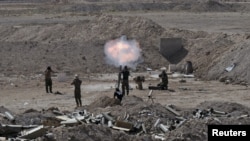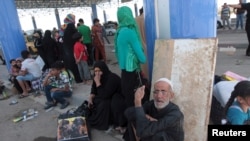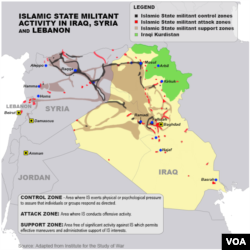U.S. President Barack Obama has "reaffirmed the strong U.S. support'' for Iraqi Prime Minister Haider al-Abadi and for a new offensive by paramilitary forces to recapture the Iraqi city of Ramadi from Islamic State insurgents.
The president's declaration came during a meeting Tuesday with top security advisers to discuss the situation in Iraq after the fall of Ramadi to the Islamic State militants.
Pentagon spokesman Colonel Steve Warren said the attempt to reclaim the Anbar provincial capital became more challenging when Iraqi security forces abandoned a vast array of American military equipment as they fled Ramadi in the face of Sunday's onslaught by the Islamic State fighters.
Warren said the Iraqi troops left behind dozens of U.S. military vehicles, including tanks, armored personnel carriers and artillery pieces. He said some of the vehicles were in working condition, others not.
The Islamic State takeover of Ramadi has led to sharp criticism of President Barack Obama's policy in the Iraqi conflict that includes air attacks on the insurgents, but no commitment of U.S. ground troops to assist the Iraqis.
"The president's plan isn't working," said House Speaker John Boehner, leader of the Republican-controlled House of Representatives. "It's time for him to come up with overarching strategy to defeat the ongoing terrorist threat."
But White House spokesman Josh Earnest blamed Congress for not giving Mr. Obama the new military authorization he asked for to wage war against the Islamic State.
"At some point, somebody in Congress needs to assume responsibility for this and not just complain about it the whole time," Earnest said.
Pentagon spokesman Warren said there is plenty of blame for the Islamic State capture of Ramadi.
"The fall of Ramadi was a failure of a lot of things," Warren said. "Leadership being one of them, tactics being one of them. War is a fluid thing. The enemy does get a vote."
Iraqi security forces, as well as several thousand Shi'ite militia members, massed Tuesday outside the Iraqi city of Ramadi ahead of a possible offensive to try to recapture the Anbar provincial capital from Islamic State militants.
Prime Minister Haider al-Abadi, who is a Shi'ite, made the decision to send in the militia, known as Hashid Shaabi or Popular Mobilization, to try to help retake the predominantly Sunni city, a move that could add to sectarian hostility in one of the most violent parts of Iraq.
In Ramadi, Sunni Islamic State fighters had set up defensive positions and laid landmines, witnesses told Reuters. As the group tightened its grip on the city, Islamists went from house to house in search of members of the police and armed forces and said they would set up courts based on Islamic Sharia law, witnesses said.
Repelled attack
Meanwhile, Shi'ite militiamen, as well as Iraqi forces and allied Sunni tribesmen, repelled an Islamic State militant attack late Monday near the town of Khalidiyah, outside Anbar's second largest city, Fallujah, Iraq's Asharqiya TV and The Associated Press reported Tuesday.
A Shi'ite militia commander told Iraqi state TV his men were also hoping to recapture the nearby town of Garma. He said his men, located on a bluff overlooking Nahiyat Garma, can see into the town. He insisted his men are awaiting orders to attack the city.
Meanwhile, the Anbar province council urged local Sunni volunteers to head to the Habaniya air base or the Fallujah operations center to reorganize and then help “liberate” Ramadi from terrorists.
The Anbar provincial council also urged the government in Baghdad to reopen a bridge leading into the capital, where thousands of refugees from Ramadi remain stranded. Shi'ite Interior Minister Mohamed Gadbhan said the bridge had been closed to prevent terrorists from infiltrating Baghdad.
A military operation with Shi'ite militias, carried out alongside Iraqi government forces, would resemble one the same paramilitary troops took part in last month to regain control of Tikrit. That effort halted Islamic State momentum toward the capital, Baghdad, from the north, and now the focus is on preventing an advance from the west of the city.
Iraq's Defense Ministry also released a video Tuesday showing the rescue of 28 soldiers after the Islamic State group seized Ramadi in several days of fighting that sent Iraqi troops fleeing and prompted Abadi to call for militia help.
The White House said Monday that U.S. President Barack Obama is receiving regular briefings on the situation.
Spokesman Eric Schultz also reiterated U.S. support to Iraqis battling to retake the city.
The United States and its allies conducted 21 airstrikes since early Monday targeting Islamic State militants in Iraq and Syria, the Combined Joint Task Force carrying out the operations said on Tuesday.
In Iraq, four airstrikes destroyed vehicles and an excavator near Ramadi, which Islamic State militants recently captured. Ten other strikes in Iraq hit near towns including Bayji, Sinjar and Fallujah, among others.
U.S. Secretary of State John Kerry said on Monday he was "absolutely confident" the situation could be reversed within days.
General Martin Dempsey, chairman of the Joint Chiefs of Staff, called Islamic State gains at Ramadi "a serious setback for its long-suffering inhabitants." He said such setbacks are "regrettable, but not uncommon in warfare."
'Humanitarian catastrophe'
Authorities said, since Friday, the fighting in Ramadi has killed at least 500 people.
Sabah Karhout Al Helbusi, head of the Anbar provincial council, also told VOA's Kurdish service Monday that a "humanitarian catastrophe" was under way in the city.
The International Organization for Migration said 40,000 people had been forced to flee Ramadi in the past four days, while a United Nations spokesman said 6,500 families have been displaced, with most fleeing eastward toward Fallujah and Khalidiyah.
The spokesman said U.N. agencies and others are delivering aid, including food, tents and mobile medical units. But U.N. agencies warned that their stocks are running low and funds are running out.
Carla Babb contributed to this report from the Pentagon. Cindy Saine contributed to this report from Capitol Hill. Edward Yeranian contributed to this report from Cairo. Some material for this report came from Reuters and AP.






